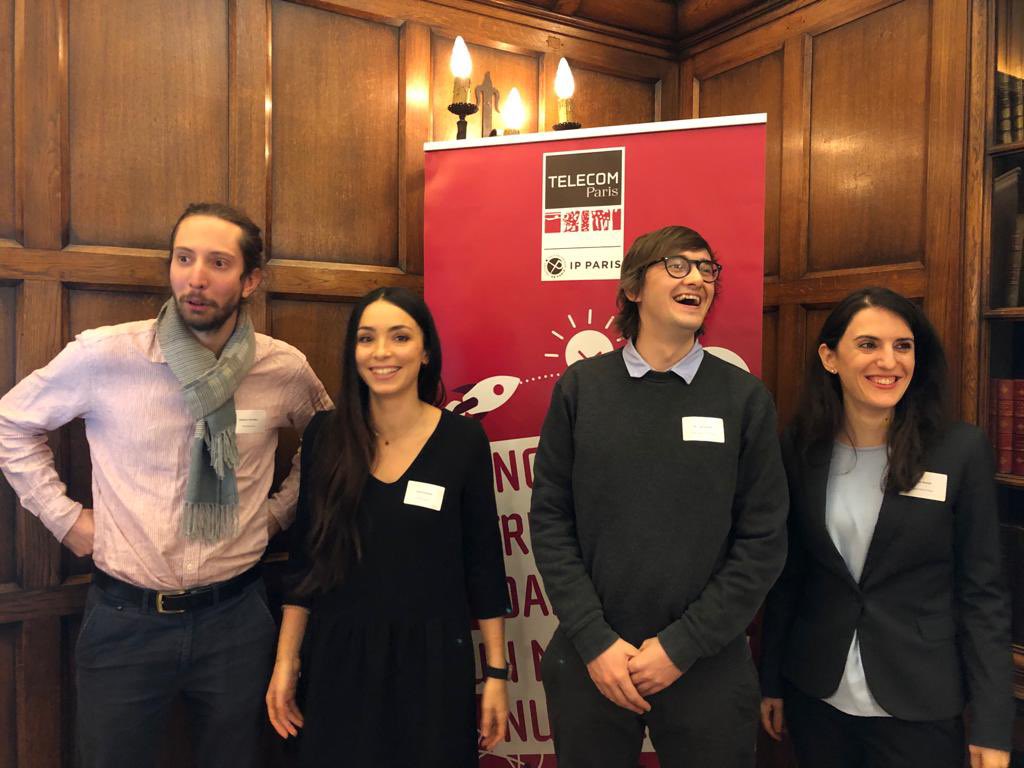-

Retour sur la 6e édition du dîner Prestige de Télécom Paris

10 Décembre 2021
Jeudi 25 novembre, 56 donatrices et donateurs ont participé au sixième dîner prestige de Télécom Paris et de la Fondation Mines-Télécom à l’hôtel Raphael : l’occasion de contribuer au financement de 4 projets de recherche liés à la transformation numérique. Au total, plus de 66 000€ ont été collectés et répartis en fonction des résultats des votes.
Bravo à Kyriaki Niotaki, dont le projet « Power autonomy for the Internet of Things applications » a remporté le plus de dons avec 20 025 € collectés.
Bravo également aux trois autres enseignantes et enseignants-chercheurs :
Un grand merci à tous les mécènes, à nos 4 enseignantes et enseignants-chercheurs sans qui cette très belle soirée n’aurait pas été possible.
Laurie Ciaramella – « Le financement des jeunes entreprises innovantes »

Son projet : – Comprendre comment les entreprises innovantes peuvent valoriser leur propriété intellectuelle pour accéder au financement privé, et évaluer l’impact de cette stratégie sur leur trajectoire
– Quantifier l’impact des dispositifs publics de soutien aux entreprises innovantes sur l’innovation et la croissance des entreprises françaises.
Jan Gugenheimer – « Ubiquitous mixed reality : building mixed reality technology to fit into the fabric of our daily lives »

Son projet : « Extended Reality (Augmented Reality/Virtual Reality/ Mixed Reality) technology is becoming increasingly affordable and capable, becoming ever more interwoven with everyday life. Human-Computer Interaction research has focused largely on innovation around XR technology, exploring new use cases and interaction techniques, understanding how this technology is used and appropriated. However, equally important is the investigation and consideration of risks posed by such advances, specifically in contributing to new vulnerabilities and attack vectors with regards to security, safety, and privacy that are unique to XR. In this talk, I will present my prior research in the field of XR and outline a future research agenda around safety, privacy, and security challenges of XR technology. With the current dominance of US companies in the field (Facebook aka Meta, Microsoft, Apple), it is essential that the European Union is starting to position itself in the field of XR and promote our vision of the Metaverse which most likely is not aligned with the current proposition of US companies. »
Kyriaki Niotaki – « Power autonomy for the Internet of Things applications »

Son projet : « The concept of the Internet of Things requires a plethora of interconnected devices to provide innovative services such as home automation and smart cities, with the ultimate goal to improve our quality of life. There are many challenges and technical limitations towards this goal, such as the self-sustainable operation of these devices. The goal of the proposed project is to bring us one-step closer to the large-scale deployment of low-power sensor nodes for the Internet of Things applications.»
Stéphane Lathuillière – « Concevoir une IA qui adapte ses connaissances dynamiquement »

Son projet : « L’apprentissage profond est aujourd’hui utilisé dans de nombreuses tâches d’analyse d’image. Ces algorithmes nécessitent de grandes bases de données pour obtenir de bonnes performances. Néanmoins, leurs performances sont affectées lorsque les données de test sont différentes des données vues précédemment. Dans ce projet, nous proposons de concevoir des mécanismes d’apprentissage qui peuvent adapter les connaissances d’un réseau de neurones de manière dynamique et autonome.»
Depuis sa création la Fondation a notamment versé plus de 600 bourses, soutenu plus de 160 thèses et financé plus de 150 start-up. Tout cela n'est possible qu'avec votre soutien.
JE FAIS UN DON